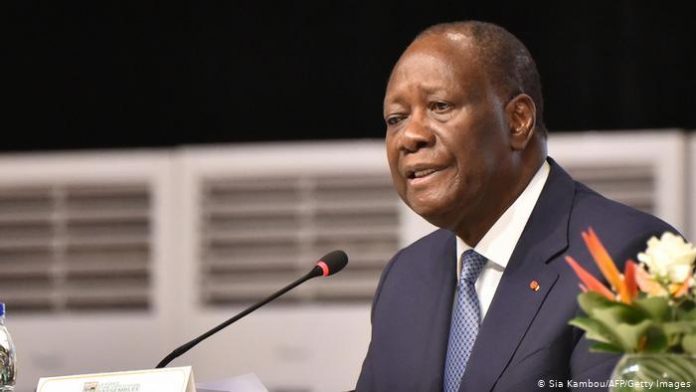The agreement between the countries of the West African Economic and Monetary Union, aimed at facilitating the creation of the eco to replace the CFA franc, will soon be ratified by Côte d’Ivoire. The fact remains that the project schedule remains very imprecise.
Alassane Ouattara intends to keep control, in the transition process – hoped for – between the CFA franc and the eco, the future single currency of the ECOWAS area. Côte d’Ivoire launched, on January 7, 2021, the process of ratifying the cooperation agreement between the eight WAEMU countries and France, concluded on December 21, 2019 in Abidjan, aimed at the creation of the eco.
This ratification takes the form of a bill that will soon be submitted for government approval. Note that France, for its part, had ratified this agreement on December 10, 2020.
According to the Ivorian government, this monetary cooperation agreement aims to preserve the key economic parameters of monetary stability and resilience of the currency of the WAMU (West African Monetary Union). Namely the fixed parity of the common currency with the euro and the support provided by the guarantee of France.
“On the other hand, the agreement puts an end to the centralization of WAMU’s foreign exchange reserves in the operations account, as well as to the presence of France in all the governing bodies of the Union” , says a statement from the Ivorian government.
Ratification of this agreement will “improve trade between member countries of the Monetary Union, strengthen the stability and resilience of economies and boost strong, sustainable and inclusive growth in the sub-region”, judges the government, through the voice of its spokesperson, Sidi Tiémoko Touré.
Expected in 2020, postponed due to the health and budgetary crisis, the operational phase is long overdue. This delay can also be explained by “dissensions between the leaders of French-speaking Africa”, economist Youssouf Carrius told AFP.
The new monetary cooperation agreement “will enter into force on the date when the guarantee agreement will be valid, subject to notification by all signatory states of the completion of their ratification procedure”, explains the French Treasury.
This guarantee agreement is the subject of negotiations between the French side and the BCEAO (Central Bank of West African States). Which, for the time being, never mentions the issue of the eco in its corporate communication …
A remarkable appointment!
“It feels like we’re going in circles,” says Kako Nubukpo. “The question behind all this is to know what level of solidarity African countries are ready with each other. It’s a difficult debate with a lot of unspoken words ”, continues the Togolese economist.
He has just taken a prominent place to observe and participate in these debates: he has just been appointed economic advisor to the chairman of the Uemoa commission, Abdallah Boureima. A choice anything but symbolic, as we know the fierce opposition of Kako Nubukpo to the CFA franc.
The delay of the eco can also be explained by a practical problem, no date or place has yet been revealed regarding the manufacture of future banknotes, still printed by the Banque de France. “It’s an African calendar. This question will be one of the subjects debated at the next Africa-France summit, in July 2021 “, assures a representative of the Elysee, quoted by Le Point.
However, the main stumbling block remains economic; West African countries are finding it difficult to jointly meet the convergence criteria necessary for the establishment of a single currency. Namely a budget deficit on the trajectory of 3%, inflation below 10% and debt below 70% of GDP.
Criteria that were illusory to meet under 2020, of course, and which will be difficult to meet in 2021, for example for Nigeria, in the grip of a resurgence of inflation. As we know, the leading economic power of ECOWAS will oppose any forced passage of the eco by French speakers. However, things are progressing, as witnessed by Alassane Ouattara’s decision, and the eco could finally circulate by 2023.
Progress carefully scrutinized by Central Africa, whose leaders may sooner or later decide to cast off monetary moorings vis-à-vis France. Moreover, the BEAC (Bank of Central African States), at the beginning of the year, took the initiative to strengthen its control over the outflows of money outside CEMAC.
And imposed restrictions on transfers or electronic payment. The Central Bank is keen to ensure that all foreign currency resources are repatriated and centralized at its level – with a delay – which makes it easier to comply with the obligation to deposit in the operations account of the French Treasury.
Reference: https://www.senat.fr/ga/ga-6/ga-63.html































